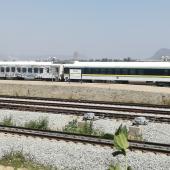Following the introduction of affordable train service under the leadership of former President Muhammadu Buhari, led by then-Minister of Transportation Rotimi Amaechi, the federal government launched a 900 million naira e-ticketing platform in January 2021. This platform aimed to address online ticketing challenges, ticket racketeering, and improve accountability.
However, recent investigations at Idu and Kubwa train stations in Abuja reveal that ticket racketeering persists, and passengers continue to face difficulties in obtaining tickets through the online platform.
For thousands of commuters who rely on the Abuja-Kaduna train service daily, the promise of convenience, safety, and efficiency is being overshadowed by challenges stemming from a malfunctioning e-ticketing platform, allegations of sabotage, and systemic inefficiencies.
Once heralded as a vital alternative to road travel in a region grappling with security concerns, the train service is now mired in complaints from passengers and suspicions of foul play by staff.
The introduction of the e-ticketing platform was meant to modernise train travel, offering passengers the ease of booking tickets online without the hassle of queuing at ticket counters. However, for many commuters, the platform has become a source of frustration.
Idu Station building/PC: Umoh Umoh | AfriCast
Sulaiman Daylop, a regular user of the Abuja-Kaduna route, recounted his ordeal. “At times, the software misbehaves. Today, it rejected my NIN for verification even though I had already paid online. Now, I have to pay again at the counter to board the train because I have an urgent appointment in Kaduna.”
Kubwa Railway station ticketing office/PC: Umoh Umoh | AfriCast
For others, like Aisha Yahaya, the experience has been equally frustrating. “I don’t know how they manage this payment platform. I tried making a payment from home, and it told me there was no train available. But when I got to the station, I bought a ticket for 4,000 naira, which is higher than the stipulated 3,500 naira. It makes me wonder if they deliberately lock the platform to force us to buy tickets at the counter.”
A recurring complaint among passengers is the discrepancy between online and counter ticket prices. The practice not only adds to passengers’ financial burdens but also raises questions about the integrity of the ticketing process.
Alleged Staff Sabotage and Ticket Racketeering
Many commuters believe the issues with the e-ticketing platform are not coincidental. A passenger, speaking anonymously, alleged deliberate sabotage by staff to exploit passengers. “It’s as if the platform is intentionally shut down at critical times. You can’t get tickets online, but the counter is always selling.”
This sentiment is echoed by Abdulkabir Ibrahim who seemed to be a regular face at the train station, and referred to as Alhaji, by the staff. Ibrahim who was traveling with his family, described how he bypassed the platform entirely by dealing directly with railway staff. “I gave them 10,000 naira for tickets for my two wives. Online, it would have cost me 7,000, but I don’t have time for that app. This is Nigeria, and you have to know how to deal with people to get things done.”
He even offered to help another stranded passenger secure a ticket, but at an extra cost of 1,000 naira “as appreciation.” Such interactions suggest that ticket racketeering may have become a normalised practice among some staff, adding to commuters’ frustrations.
Overcrowding and Security Concerns
Beyond financial irregularities, the alleged ticket racketeering has created safety concerns. Software and cloud engineer, Ekemini Johnson who specialises in E-commerce platforms highlighted troubling discrepancies in passenger numbers. “Each train coach is designed for 84 passengers, but I’ve seen up to 100 people in one coach. Worse, some passengers have duplicate seat numbers,” he said.
Idu Station rail tracks/PC: Umoh Umoh | AfriCast
Johnson suspects these irregularities are linked to a compromised e-ticketing platform. “The platform may have been cloned, allowing it to function like the original but directing payments into private accounts. This means revenue from extra passengers goes unaccounted for, potentially into the pockets of staff.”
Certified Security Specialist, with Close Watch Security Services Nigeria Limited, Timipreye Otobo warned of the broader implications. “These practices could pose serious security risks. If someone is willing to pay extra, they can bypass regular checks. This could enable dangerous individuals, like terrorists or kidnappers, to gain access to trains.”
Despite these challenges, the Nigerian Railway Corporation (NRC) reported impressive revenue growth. Data from the National Bureau of Statistics (NBS) revealed that the NRC generated 1.69 billion naira in the second quarter of 2024, a 53.14% increase compared to the same period in 2023. Other income receipts surged by over 5,000%, rising from 18.74 million naira in 2023 to 994.68 million naira in 2024.
These figures point to increased patronage, yet they also raise questions about how much revenue may be leaking through unofficial channels. Experts argue that without accountability for irregular ticket sales and overcapacity, the reported growth may not reflect the full story.
Kubwa Station: A Mirror of the Challenges
A visit to the Kubwa train station painted a similar picture of commuter frustration. Dozens of passengers crowded the ticket counters, many visibly agitated after failed attempts to secure tickets online.
Kubwa Station Entrance/PC: Umoh Umoh | AfriCast
Aisha Yahaya, one of the stranded passengers, expressed disbelief at the inefficiency. “The platform said no trains were available, but here I am, buying a ticket for 4,000 naira over the counter. I don’t understand why this keeps happening.”
The chaos and confusion at the station reflected the broader dissatisfaction with the system, with passengers demanding answers and solutions.
The Nigeria Railway Corporation, NRC has acknowledged the complaints and promised to investigate. Yakub Mahmood, NRC’s Deputy Director of Public Relations, stated, “We are aware of the issues and are currently conducting an investigation. Until it is concluded, we will refrain from further comments.”
While the announcement suggests a willingness to address the problems, commuters are skeptical, given the lack of tangible improvements so far.





GIPHY App Key not set. Please check settings